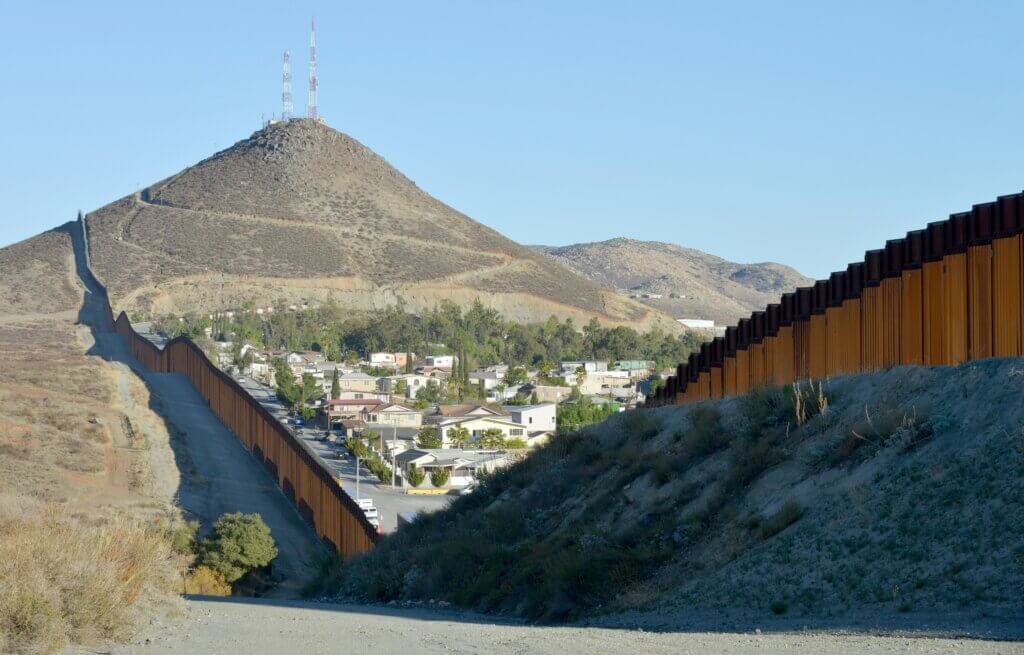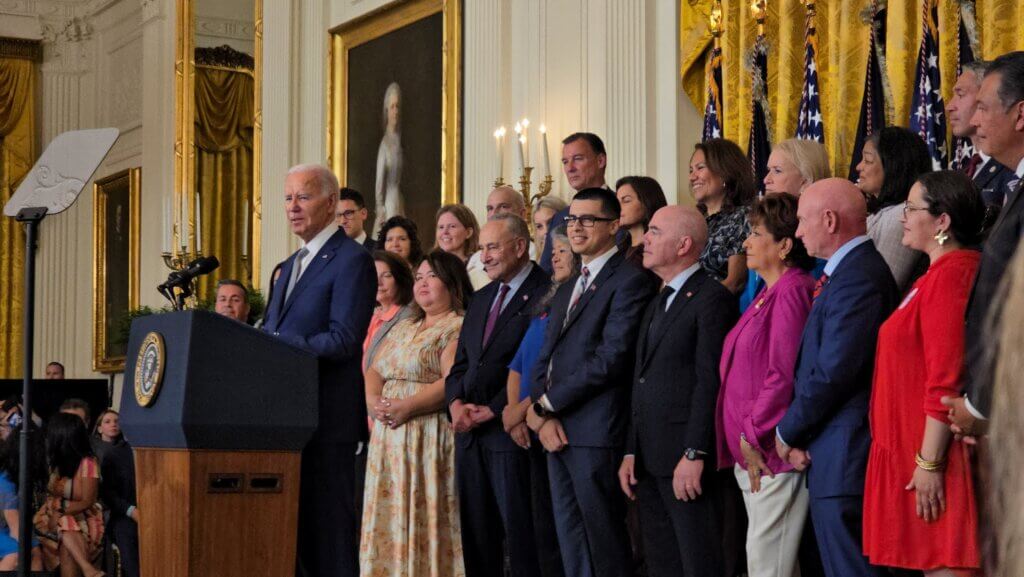Creating a Roadmap for Undocumented Students:
How Mentoring and College Readiness Programs Can Help Young People Without Papers Further Their Education

Author Jorge Contreras was a 2019-2020 fellow with the UnidosUS Líderes Avanzando Through College program.
As the coronavirus pandemic continues to take a toll on the United States, undocumented students are facing new challenges when it comes to completing their education and applying to college.
Schools across the country have been switching to online learning, leaving some students behind. One reason is that some undocumented families don’t want to apply for free internet because they fear their information will be put into a government database. Without internet access, however, their children may fall behind in their classes.
And that is just one of the challenges undocumented youth face. Undocumented people and U.S. citizens whose parents are undocumented are not eligible for the IRS’s $1,200 economic impact payment, depriving them of a financial boost many sorely need. They also miss out on the $500 payment for each child in the family. This has put many families in dire straits, as some work in the service industry and were laid off under stay-at-home orders.
These challenges make it more urgent than ever to support undocumented students as they prepare to apply for college. A study by Georgetown Public Policy Institute shows 65% of jobs require a post-secondary degree, and that figure is expected to increase in coming years. The long-term economic blow from the COVID-19 pandemic will make jobs more competitive because they will be scarce. This exacerbates the already enormous challenge the nation’s 3.2 million undocumented students face in realizing the American Dream.
U.S. Department of Education data show that only about 5 to 10% of undocumented students pursue higher education, and fewer still actually graduate. The barriers to our college enrollment and completion are many. For starters, undocumented students often lack the financial resources, as well as the preparation needed to apply for college, get accepted, and then navigate the higher-education experience. To make matters more complicated, they sometimes don’t have high school teachers and guidance counselors encouraging them to consider college, and their own families may be telling them that college isn’t a priority.
This has often been the case for Latinos, regardless of their immigration status. Census data show that Hispanics continue to be overrepresented among the population in poverty. They made up 18.3% of the total population in 2017 but accounted for 27.2% of the population in poverty. And what do poor families usually need? An immediate source of income, not one that has to wait at least four years and hinges on taking out loans. At least that’s the thought process for many. According to a 2014 National Journal poll, 66% of Hispanics who got a job or entered the military directly after high school said they didn’t first enroll in college because they needed to help support their families. That figure is just 39% among Whites.
But the truth is, a college degree can set you up to make more money, which can translate to longer-term financial stability for graduates and the families they may be supporting. According to the National Center for Education Statistics, in 2016, Latino workers aged 24 to 34 with an associate degree made a median income of $34,900 and those with a bachelor’s made $44,730, while those with just a high school diploma made $29,960.
More and more Latinos are receiving that message. Over the past nearly three decades, Latino enrollment in higher education has gone from 782,400 in 1990 to 3.4 million in 2016, a 337% jump. It’s hard to find data on what percentage of those are undocumented, but we know that a lot of them struggle to finish their degrees and graduate within six years because of the financial and logistical barriers they face.
These numbers challenge the notion of equal access to education in America. U.S. federal law stipulates that all K-12-age children have the right to a free public education. The gray area, of course, is whether they have the preparation and the money to get into and finish college. And one of the biggest barriers undocumented students face is that they are excluded from federally funded college-readiness programs where a higher education institution is the sole programming organization. That’s the case with the U.S. Department of Education’s Gaining Early Awareness and Readiness Undergraduate Programs (GEAR UP), which provides six-to-seven-year-long college-readiness program grants to states and partnerships for high-poverty middle and high schools. And while the Supreme Court this month ruled that the Trump administration cannot immediately protect DACA recipients, a few weeks earlier, the Department of Education issued an emergency rule that excludes DACA students from accessing pandemic-era emergency aid.

High school DACA students need strong educational leaders to help them navigate this complex political landscape. In my case, I was fortunate enough to have some concerned high school teachers who told me how the DACA (Deferred Action for Childhood Arrivals) program gave me the right to go to college and then how to apply for it. Through them, I was able to receive a full-ride scholarship from The Dream.US Scholarship and I’m now majoring in biology. But I still face plenty of challenges. After all, I’m the son of Javier and Maria De La Luz Contreras, and I’m the first one in my family to navigate the college experience.
But going through these challenges has inspired me to give some undocumented students in my home community a college-readiness program like the one they’ve been denied by the U.S. government. With this in mind, in 2019, I sought and received permission from my high school alma mater to develop and lead a mentoring program for undocumented students.
After obtaining permission from the school to speak with the students in person, I spent some time hearing about their lives and their feelings about college. Much as I expected, they expressed a lot of mixed emotions about the prospect of college, and in fact, most of them hadn’t thought of it as an option. But when I shared my personal story and the obstacles I had overcome, I immediately noted how relieved they seemed. It was the first time someone from a similar background to theirs had talked to them about a successful college experience and what it took to get there.
With graduation approaching, I wanted to make sure they had all the resources to do the same thing. Sure, my story informed and inspired them, but there was one other component they really needed to move forward in exploring and applying for college. It was parent engagement. I arranged conversations with the students and parents to discuss the importance of higher education and pursuing the students’ dreams. I offered the parents brochures of the local universities and community colleges to help them find a path to an affordable education. The principal and some counselors also offered support. I used my personal story to relate to them as we discussed the struggles of immigrant families. It helped that I was able to talk about how my own working-class immigrant parents had been supportive of my decision to attend college.
Now I’m working on how to keep these students motivated and focused on their higher education goals. I’m doing that by establishing a chapter of Define American, an organization that uses media and the power of storytelling to transcend politics and shift the conversation about immigrants, identity, and citizenship in a changing America. It also helps these students see themselves as role models for students in the lower grade levels. By bonding with undocumented college students and with each other, these youth develop a support system for navigating the complexities of their lives in a border town where they often grow up in mixed-status homes. That bond gives them the information, the courage, and the strength they need to change their attitudes about the prospect of college and the impact it could have on their futures.
The more we are able to get undocumented students into and through college, the more we will see the impact they can have on their communities, and on the larger U.S. society. By obtaining more skilled, higher-paying jobs, these young people help to create a richer, more innovative economy, because their diverse life experiences and cultures lead to new ways of thinking and problem solving. Plus, as the College Board notes, the more money they make, the more money they put back into the economy through both their private investments and the taxes they pay.
College preparation is difficult for us first-generation undocumented students because we don’t know what to expect, or because life circumstances have placed other expectations upon us. But we can help to create a blueprint for others. This is why I took it upon myself to set up a mentoring program for undocumented students like me. In addition to building their self-confidence and increasing their chances of obtaining a college degree, I believe I can create a model for improving equal access to higher education for all students, a model the U.S. government could eventually adopt across the country. Everybody can pitch in by advocating for federal policies that ensure equal access to education for all.





